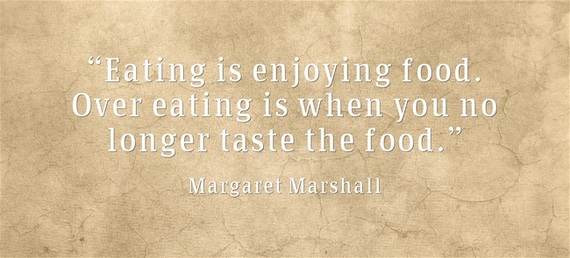Celebrate a birthday, share fun times with loved ones, and it's all about the memory. Take a vacation and your most prized souvenir is your memories. When I spend a day with my family, we reminisce. Our hearts and emotions are in these conversations because life is built on memories. They can bring tears of joy or pangs of sadness. Two people can remember the same event differently.
The same is true for your eating. Enjoying your food is not only the taste at the time, it's also the memory of the other times you enjoyed the same food. The minutes you physically enjoy your food are fleeting; what's left is the memory.
If you ate something as a child and didn't like it, chances are you don't eat it today. One item that comes to my mind is black licorice. I did not like it as a child and have not eaten it since. Yet there are food items that we like, and the minute we spot them the memory appears. We want it, and we want it now.
Memories of food are powerful. You may go out of your way to purchase a specific food item because you've had it before and want it again. You may travel a distance to dine in a certain restaurant because of the memory of the food served.
Your eating decisions are based on memories more often than you realize. When you are not in touch with your stream of food-related memories it could lead to unplanned eating and cravings.
There are three situations in which I think you should recognize how strong your food memories influence your eating:
Eating and over eating:
There is a difference between eating and over eating. Eating is enjoying your food; over eating is eating to the point of discomfort. Over eating can destroy a memory of a food. It's only a few bites between, "This is delicious," and "I'm stuffed and uncomfortable," leaving you feeling sick.
If it's a food you enjoy, you may not want your memory to be, "Last time I ate that, I felt sick." Eat to savor the memory of good food.
Comfort food:
Comfort food is a food item that takes your memory back to a time or place. Comfort food is different for everyone. Some think stews or heavy meals are comfort food, while others believe chocolate or ice cream is. Comfort food is never just one item; you can have many comfort foods. Often we look to comfort food when we are upset or anxious. We need the memory of a simpler time or a loved one.
Often comfort food is over eaten because it's not about the food, it's about a feeling. You can never satisfy a feeling with food.
Keep the comfort food you enjoy for special occasions, and deal with current feelings in a non-food way.
You eat because of a friend's food memories:
You may be in a restaurant with a friend, and they suggest you eat something they've had before and they remember it was delicious. You hadn't planned on eating it because you wanted another item, yet you order their suggestion anyway. Eating someone else's memory may lead you to unplanned eating. You might not enjoy it as much as what you really wanted. It could leave you unsatisfied and craving something else. Another person's food memory may not taste as good as your own.
Often I ask clients, to consider before they eat -- how they will feel after they have eaten. This helps them to choose food that will make them feel good, and avoid food that will leave them unsatisfied.
Eat to savor the memory of your food.
